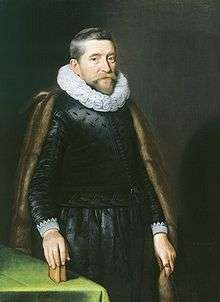
Sir Henry Wotton
Sir Henry Wotton (March 30, 1568 – December 1639) was an English author and diplomat.
Quotes
- How happy is he born and taught,
That serveth not another's will;
Whose armor is his honest thought,
And simple truth his utmost skill!- The Character of a Happy Life (1614), stanza 1.
- Who God doth late and early pray,
More of his grace than gifts to send,
And entertains the harmless day
With a well-chosen book or friend.- The Character of a Happy Life (1614), stanza 5.
- Lord of himself, though not of lands;
And having nothing, yet hath all.- The Character of a Happy Life (1614), stanza 6. Compare: "As having nothing, and yet possessing all things", 2 Corinthians vi. 10.
- You meaner beauties of the night,
That poorly satisfy our eyes
More by your number than your light;
You common people of the skies,
What are you when the sun shall rise?- On His Mistress, the Queen of Bohemia, stanza 1 (1624). In some versions "moon" replaces "sun". This was printed with music as early as 1624, in Est's "Sixth Set of Books", for example.
- I am but a gatherer and disposer of other men's stuff.
- Preface to the Elements of Architecture (1624).
- Love lodged in a woman's breast
Is but a guest.- A Woman's Heart (1651).
- He first deceased; she for a little tried
To live without him, liked it not, and died.- Upon the Death of Sir Albert Morton's Wife (1651).
- Hanging was the worst use a man could be put to.
- The Disparity Between Buckingham and Essex (1651).
- An ambassador is an honest man sent to lie abroad for the commonwealth.
- Reliquiae Wottonainae (1651). In a letter to Velserus, 1612, Wotton says, "This merry definition of an ambassador I had chanced to set down at my friend's, Mr. Christopher Fleckamore, in his Album".
- The itch of disputing will prove the scab of churches.
- A Panegyric to King Charles (1651).
- Hic jacet hujus sententiæ primus author:
DISPUTANDI PRURITUS ECCLESIARUM SCABIES.
Nomen alias quære.- Translation: Here lies the author of this phrase: "The itch for disputing is the sore of churches." Seek his name elsewhere.
- Inscription on Wotton's gravestone, so placed at his direction.
- Advised a young diplomat "to tell the truth, and so puzzle and confound his enemies."
- Attributed. E.g., Vol 24, Encyclopedia Britannica of Arts, Sciences, and General Literature, page 721 (9th Ed. 1894).
- Compare Mark Twain who, in Following the Equator, said "When in doubt, tell the truth" (which is often mis-quoted as containing an additional clause providing "it will confound your enemies and astound your friends").
External links
This article is issued from
Wikiquote.
The text is licensed under Creative
Commons - Attribution - Sharealike.
Additional terms may apply for the media files.